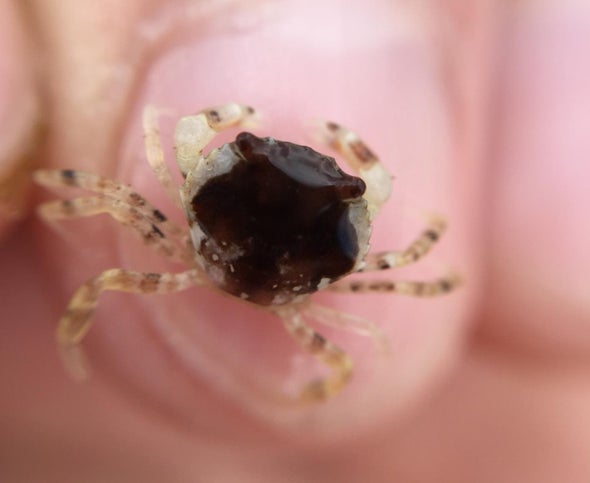(单词翻译:单击)
听力文本
This is Scientific American's 60-second Science, I'm Susanne Bard.
Large oceangoing vessels like oil tankers and cruise ships produce noise that travels long distances underwater. That audio pollution can disrupt the sounds that marine mammals, fish and other animals use to communicate.
"When there's lots of noise from ship traffic, it basically masks those sounds so they just can't hear each other."
University of Exeter sensory ecologist Emily Carter. She wondered whether ship noise might also be detrimental to animals that don't rely on sound for communication. For example, young shore crabs that use camouflage to hide from predators.
"So they can actually change their color to match whatever it is that they're sitting on, basically to make it harder for predators to find them."
Carter suspected that stress from ship noise might hinder the change process. To find out, she and her colleagues collected juvenile shore crabs with dark shells and brought them back to the lab. They placed the crabs in tanks full of white gravel. An underwater speaker in each tank played quiet natural sounds at all times. One group of crabs also heard loud natural sounds every hour. But another group was subjected to hourly recordings of large ships.

Carter says shorebirds—which eat the crabs—can see UV light, so she used ultraviolet photography to determine how well the crabs blended into their new habitat over time.
"Through the eyes of a shorebird—so through a bird's perspective—were they camouflaged? Weren't they camouflaged? How obvious would they be?"
After eight weeks, the crabs that heard only natural sounds had become much lighter and were well camouflaged. "But the ones that were exposed to the ship noise didn't change color as much. And then, as a result, they weren't as camouflaged at the end of the experiment. So they'd be much more noticeable to a predator."
What's more, in another experiment, crabs failed to flee when they heard ship noise during a simulated predator attack.
"They either didn't respond at all, or they did respond, but they were much, much slower to do so. So in a real life setting, they would have been captured much more easily."
Carter says the stress caused by ship noise may interfere with hormones that regulate color change in crabs or sap the energy needed to make the change efficiently. The study is in the journal Current Biology.
The research not only puts a spotlight on the unintended consequences of noise pollution, but is a reminder that too much stress isn't just bad for people—it can also be deadly to wildlife that needs some peace and quiet.
Thanks for listening for Scientific American's 60-second Science. I'm Susanne Bard.
参考译文
这里是科学美国人——60秒科学系列,我是苏珊娜·巴德。
油轮和游轮这类大型远洋船只会产生在水下长距离传播的噪音。这种声音污染会干扰海洋哺乳动物、鱼类和其它动物的交流声音。
“船舶交通产生大量噪音时,基本上会掩盖动物的交流声音,导致动物听不到彼此的声音。”
埃克塞特大学的感官生态学家艾米莉·卡特说到。她想知道船舶噪音是否也会对不依赖声音进行交流的动物造成危害。比如用伪装来躲避捕食者的年轻食草蟹。
“它们可以通过变色让自已与身上物体的颜色相一致,使捕食者更难找到它们。”
卡特怀疑船舶噪音压力可能会阻碍变色过程。为了找到答案,她和同事收集了黑壳年轻食草蟹,并把它们带回实验室。他们将食草蟹放入装满白色碎石的水箱里。每个水箱里都装有一个水下扬声器,始终播放安静的自然声音。一组食草蟹每隔一小时还会听到喧闹的自然声音。但另一组食草蟹每小时都要遭受大型船只噪音的侵袭。
卡特表示,以食草蟹为食的滨鸟能看到紫外线,因此她用紫外线照相技术判断食草蟹随时间推移融入新栖息地的程度。
“通过滨鸟的眼睛,即通过鸟类视角,来观察食草蟹是否在伪装,是否没有伪装以及它们有多明显。”
八周后,只听自然声音的食草蟹的颜色变浅,伪装得很好。“但那些暴露在船舶噪音中的食草蟹,颜色并未改变那么多。结果,它们在实验结束时也没怎么伪装。因此,它们会更容易被捕食者发现。”
更重要的是,在另一项实验进行模拟捕食者攻击时,听船舶噪音的螃蟹逃跑失败。
“它们要么完全没有反应,要么做出了反应,但反应慢了太多。因此在真实生活环境中,它们会更容易被捉住。”
卡特表示,船舶噪音造成的压力可能会干扰管理螃蟹变色的荷尔蒙,或消耗有效变色所需的能量。这项研究发表在《当代生物学》期刊上。
这项研究不仅强调噪音污染的意外后果,同时提醒人们,过多压力不仅对人类有害,对需要宁静的野生动物来说还可能是致命的。
谢谢大家收听科学美国人——60秒科学。我是苏珊娜·巴德。
译文为可可英语翻译,未经授权请勿转载!
重点讲解
重点讲解:
1. be detrimental to 有害的;不利的;
Poor eating habits are detrimental to health.
不良的饮食习惯对健康有害。
2. be exposed to 使暴露于(险境);使遭受(危险或不快);
They were exposed to radioactive fallout during nuclear weapons tests.
在核武器试验中他们暴露在放射性尘埃之下。
3. at the end of 在…的结尾;
It was a rushed decision made at the end of the meeting.
那是会议结束时匆忙作出的决定。
4. what's more 更有甚者;更为重要的是;此外;
You should remember it, and what's more, you should get it right.
你应该记住它,更重要的是,应该正确理解它。


